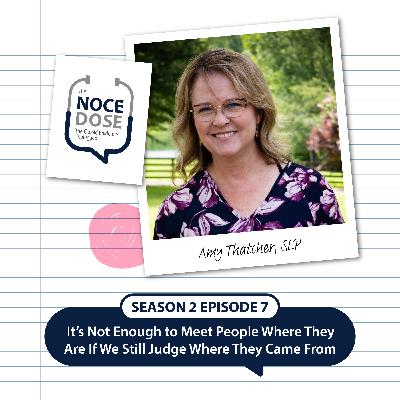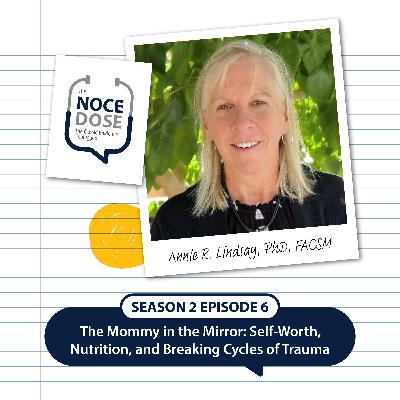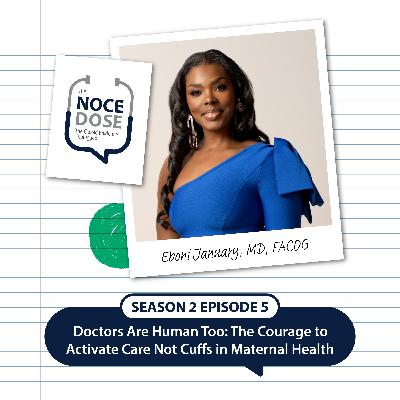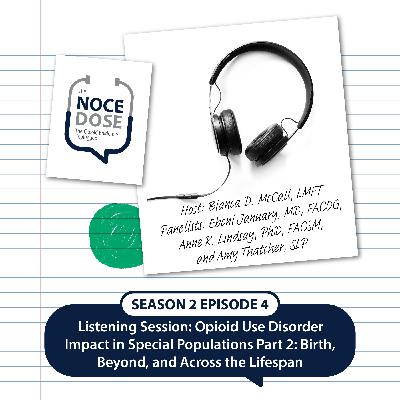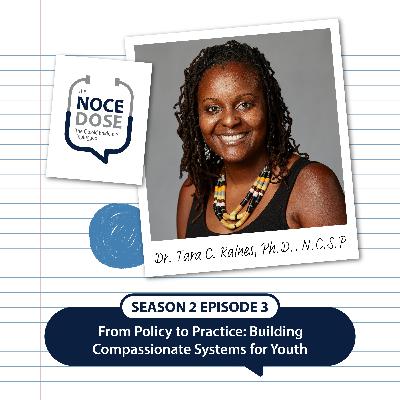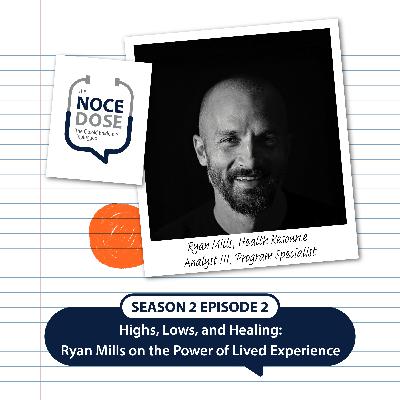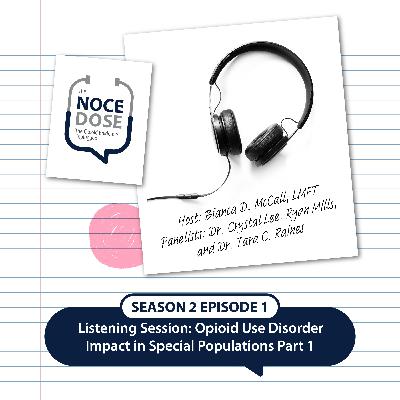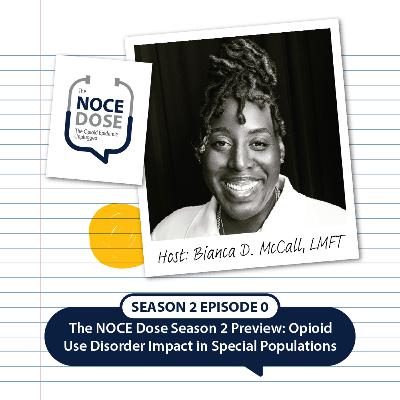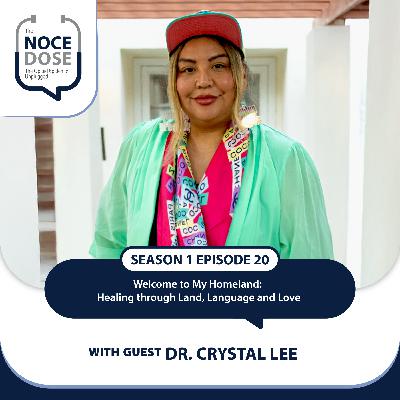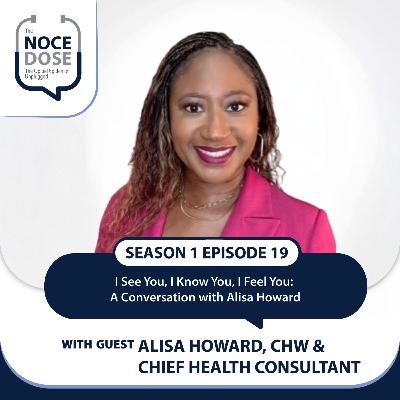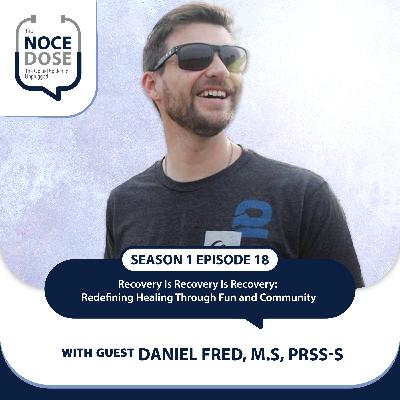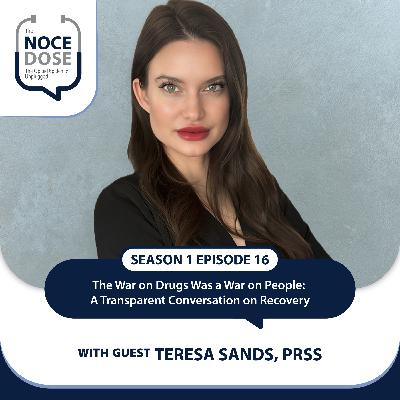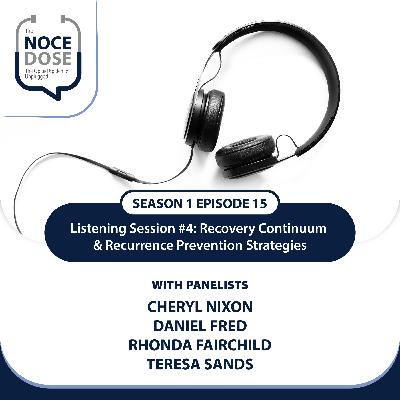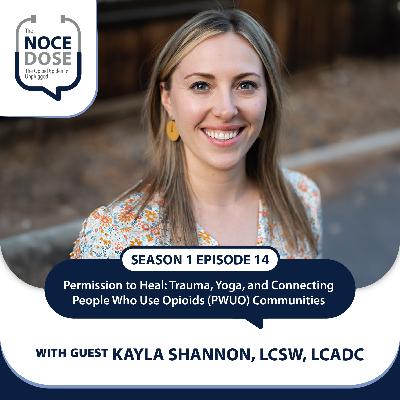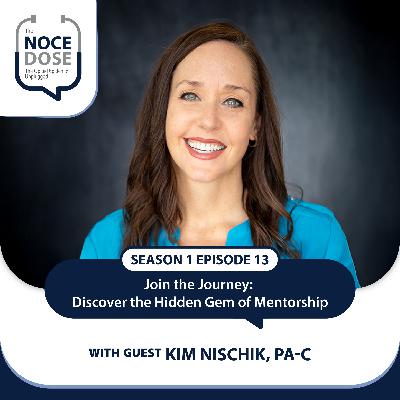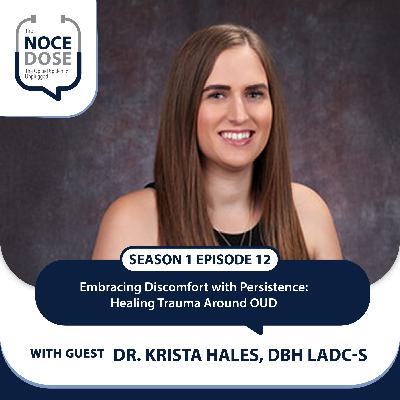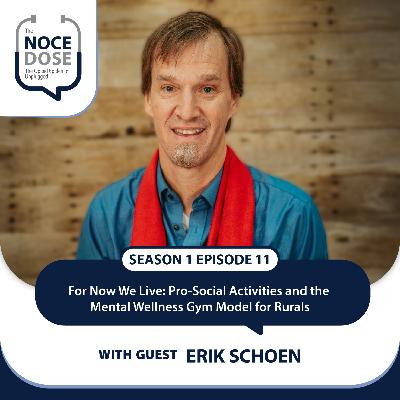Discover The NOCE Dose: The Opioid Crisis Unplugged
The NOCE Dose: The Opioid Crisis Unplugged

The NOCE Dose: The Opioid Crisis Unplugged
Author: The Nevada Opioid Center of Excellence (NOCE)
Subscribed: 3Played: 9Subscribe
Share
© The Nevada Opioid Center of Excellence (NOCE)
Description
The NOCE Dose: The Opioid Crisis Unplugged is a concise and insightful podcast offering a deeper dive into the realities faced by professionals and champions combating the opioid epidemic within Nevada. Join us as we reconnect with expert panelists from our Listening Sessions, providing a behind-the-scenes look at their work and insights into the pressing issues of prevention and diversion, harm reduction, opioid use treatment, recovery, and reoccurrence prevention.
29 Episodes
Reverse
In this episode of The NOCE Dose, we are joined by Amy Thatcher, a speech-language pathologist and neonatal feeding specialist with over fifteen years of experience supporting medically fragile and opioid-exposed infants. Together, we explore what truly family-centered care looks like in the NICU—from dismantling stigma and clinical bias to building trust with birthing parents and extended families. Amy shares why “meeting people where they are” is not enough if judgment remains in the room, and how small, intentional practices—calling babies by name, modeling caregiving, and inviting families into the healing process—can radically improve outcomes for infants with neonatal abstinence syndrome (NAS).The conversation also dives into the long-term developmental implications of early opioid exposure, including feeding, oral-motor development, communication milestones, and theory of mind. We discuss the impact of the Eat, Sleep, Console model, the importance of early intervention services, and how awe, transparency, and compassionate education can quiet shame and empower caregivers. This episode is a powerful reminder that healing begins not only with clinical tools, but with humanity, trust, and the courage to break silence—one baby, one family, and one conversation at a time.
In this compelling episode, host Bianca D. McCall reconnects with Dr. Annie Lindsay to dive deeper into the gendered realities of opioid and stimulant use among women. Dr. Lindsay breaks down why women of reproductive age are one of the fastest-growing groups affected by substance use, highlighting the overlooked role of methamphetamine, the weight of trauma, and the profound impact of limited social and human capital. Together, they explore how biology, caregiving demands, body image pressures, and generational patterns shape women’s experiences with use, recovery, and the healthcare systems meant to support them.The conversation also shines a light on the critical—and often ignored—role of nutrition in early recovery. Dr. Lindsay explains how cravings, emotional eating, blood sugar instability, and nutrient deficiencies interact with anxiety, depression, and relapse risk. She offers practical pathways for integrating nutrition, supplementation, and family-based education into treatment, showing how these approaches can stabilize the brain, support healing, and help families “sidestep” harmful generational cycles. This episode is essential listening for providers, advocates, and anyone seeking a more complete picture of women’s recovery journeys.
In this episode of The NOCE Dose, host Bianca D. McCall, LMFT welcomes Dr. Eboni January—physician, author, and advocate—for a transformative discussion on empathy, maternal health, and the human side of medicine. Together, they examine how opioid use disorder impacts mothers and families, challenging traditional systems that punish rather than support.Dr. January shares her experiences as both a provider and a mother, emphasizing that true healing begins with compassion—for patients and practitioners alike. This conversation explores the power of education, cultural competence, and self-care in reshaping healthcare systems, inspiring doctors and communities to lead with care, not cuffs.
This second Listening Session continues our exploration of Opioid Use Disorder (OUD) in special populations, shifting the lens to the full lifespan. Building upon Part 1's focus on youth and Tribal communities, Part 2 will examine the intergenerational and biological effects of opioid exposure from the womb through later life stages. Panelists will include a speech-language pathologist and lactation consultant working with opioid-exposed infants in neonatal care, a nutritionist exploring how OUD affects metabolism and nourishment, a biomedical engineer sharing technological approaches for assessing long-term developmental impact, and a gerontological expert addressing OUD in older adults.
In this episode of The NOCE Dose, host Bianca D. McCall, LMFT sits down with Dr. Tara C. Raines, Ph.D., N.C.S.P., a passionate advocate for youth mental health and community empowerment. Together, they explore how the opioid crisis impacts children, families, and educators—and how compassion, advocacy, and education can inspire systemic change. Dr. Raines shares insights on the importance of understanding the “why” behind student behaviors, the power of lived experience in shaping interventions, and the role of legislative wins in expanding access to mental health services. This heartfelt conversation emphasizes that healing begins in community—through empathy, collaboration, and the courage to take action for the next generation.
In this episode of The NOCE Dose, host Bianca D. McCall sits down with Ryan Mills, a former professional BMX rider whose story embodies both the pain and the promise of recovery. Ryan opens up about his battle with opioid use disorder, exploring how the intense pressure to perform can lead youth and high-achieving athletes down a dangerous path. Together, Bianca and Ryan unpack the importance of holistic pain management, peer support, and the power of lived experience in recovery.The conversation challenges traditional ideas of accountability, calling for more compassionate and flexible recovery programs that honor the complexities of addiction and identity rebuilding. Ryan’s reflections offer a message of hope—that even after deep struggle, a renewed sense of purpose and community can emerge.
Moderator: Bianca D. McCall, LMFTPanelists: Dr. Tara C. Raines, Ph.D., N.C.S.P | Dr. Crystal Lee (Diné) | Ryan MillsIn this episode, host Bianca D. McCall, LMFT leads an insightful discussion on how opioid use disorder impacts diverse and often underserved populations. Drawing on years of clinical practice, research, and lived experience, the panel explores prevention, recovery, and culturally responsive approaches to behavioral health.Bianca D. McCall, LMFT is a retired professional women’s basketball player turned international TED speaker and mental health innovator. With over 25 years in behavioral health and 12 as a healthcare CEO, she has pioneered digital health tools aimed at improving emotional well-being and preventing psychological injury. Bianca represents Nevada on national suicide prevention committees through SAMHSA and the U.S. Department of Public Health. As a clinical instructor and curriculum developer with CASAT at the University of Nevada, Reno, she brings both expertise and compassion to her leadership in this discussion.Dr. Tara C. Raines, Ph.D., N.C.S.P serves as the Deputy Director of the Children’s Advocacy Alliance of Nevada. A nationally recognized school psychologist and researcher, Dr. Raines focuses on early identification of emotional and behavioral risks in youth and addresses the systemic inequities that drive many toward the juvenile justice system. Her work promotes healing-centered, culturally responsive care and bilingual workforce development in mental health and education. With experience at the University of Denver and UNLV, Dr. Raines brings evidence-based insight to the conversation on trauma and intergenerational effects of the opioid crisis.Dr. Crystal Lee (Diné) is an Assistant Professor at the University of New Mexico College of Population Health and Founder/CEO of United Natives, a national nonprofit delivering free telehealth mental health services to Indigenous communities. Her research and advocacy span infectious disease prevention, Indigenous health policy, and global representation for Native peoples. She has served on multiple United Nations Indigenous caucuses, advised the Obama Administration, and been honored by President Bill Clinton for her leadership. A trailblazer in business and health equity, Dr. Lee’s work bridges culture, policy, and technology to uplift Indigenous wellness.Ryan Mills is a former professional BMX rider whose path to recovery after a decade-long struggle with heroin addiction has become a story of hope and resilience. After completing a drug court program, Ryan rebuilt his life, reconnecting with family, community, and his passion for BMX. Now a Health Resource Analyst III and Program Specialist with Nevada’s Division of Public and Behavioral Health, he uses his experience to advocate for others navigating addiction and recovery. Ryan’s journey reminds listeners that transformation is possible through support, purpose, and persistence.Together, this panel dives deep into how opioid use disorder intersects with culture, identity, access, and recovery. From research and policy to personal narrative, this episode offers a powerful look at healing and innovation across communities.
In season 2 of the NOCE Dose we examine how Opioid Use Disorder (OUD) impacts specific population groups that experience distinctive health vulnerabilities, including youth, older adults, individuals with disabilities and neurodivergence, birthing women and Tribal Nations. Anchored in evidence-based frameworks for trauma-informed care, developmental risk, and structural competency, the season prioritizes the integration of firsthand narratives with the data on service gaps. Listeners will engage in structured dialogue to better understand how variations in age, ability, neurodevelopment, and community context influence OUD risk trajectories and access to care. This season supports a broader objective of informing service models that are integrity-based, developmentally appropriate, and community-informed, consistent with national public health guidance for behavioral health fairness.
In this deeply meaningful episode of The NOCE Dose, host Bianca D. McCall is joined by Dr. Crystal Lee, a public health expert and advocate for Indigenous communities, for a powerful discussion on Indigenous health, identity, and healing. Together, they explore how acknowledging historical truths, embracing cultural worldviews, and reclaiming Indigenous languages are essential steps toward collective wellness and self-love.Dr. Lee unpacks the importance of community support in addressing mental health and substance use disorder within Native populations, while also highlighting the impact of misclassification and systemic barriers. The conversation delves into the role of culturally responsive care, spiritual connection to land, and how sports, especially basketball, can be a meaningful bridge for Indigenous youth.Listeners will be reminded that healing happens in discomfort, that “land is our church,” and that unity is not just a concept, but a practice rooted in cultural and spiritual strength. This episode serves as a call to action to support Indigenous healing efforts, honor ancestral truths, and center community in all wellness work.Funding for this activity was made possible in whole or in part by the Nevada Department of Health and Human Services (DHHS) Director’s Office through the Fund for a Resilient Nevada, established in Nevada Revised Statutes 433.712 through 433.744. The opinions, findings, conclusions, and recommendations expressed in this podcast are those of the author(s) and do not necessarily represent the official views of the Nevada Opioid Center of Excellence or its funders.
In this enlightening episode of The NOCE Dose, host Bianca D. McCall sits down with Alisa Howard to explore the vital role of Community Health Workers (CHWs) in behavioral health, with a particular focus on addressing opioid use disorder. With compassion and clarity, Alisa underscores the power of lived experience in reducing stigma, building trust, and humanizing the healthcare system.Together, they delve into how CHWs act as a bridge between clinical care and the communities they serve, offering peer support, cultural understanding, and a voice for those often left unheard. Alisa reflects on how “the thing that once saved me is now killing me,” highlighting the complexities of recovery and the importance of empathy in healing work.The conversation also touches on the financial sustainability of CHW roles, the need for formal integration into healthcare settings, and the professional development of CHWs. Through themes of forgiveness, sustainability, and the 8 Dimensions of Wellness, this episode challenges healthcare systems to rethink how they define support and healing.As Alisa says, “Community needs to be community all of the time,” and this episode is a reminder that true health must also include humanity.Funding for this activity was made possible in whole or in part by the Nevada Department of Health and Human Services (DHHS) Director’s Office through the Fund for a Resilient Nevada, established in Nevada Revised Statutes 433.712 through 433.744. The opinions, findings, conclusions, and recommendations expressed in this podcast are those of the author(s) and do not necessarily represent the official views of the Nevada Opioid Center of Excellence or its funders.
In this episode of The NOCE Dose podcast, host Bianca D. McCall welcomes Daniel Fred, Director of the Nevada Recovery and Prevention (NRAP) Program, to explore the evolving landscape of opioid recovery. Together, they dive into insights from a recent listening session, focusing on how creating fun, inclusive spaces—especially on campuses—can foster stronger recovery communities. Daniel emphasizes that "recovery is recovery is recovery," reminding listeners that presence and belief are essential to healing. The conversation highlights the importance of removing shame from the recovery process, using student-friendly language, and believing in the collective power of community. Daniel and Bianca also discuss how recovery doesn't have to be fearful or isolating; instead, it can be joyful, intentional, and deeply connected. This episode is a powerful reminder that the "F-word" in recovery is fun—and that celebrating life is a vital part of healing.Funding for this activity was made possible in whole or in part by the Nevada Department of Health and Human Services (DHHS) Director’s Office through the Fund for a Resilient Nevada, established in Nevada Revised Statutes 433.712 through 433.744. The opinions, findings, conclusions, and recommendations expressed in this podcast are those of the author(s) and do not necessarily represent the official views of the Nevada Opioid Center of Excellence or its funders.
In this episode of The NOCE Dose podcast, host Bianca D. McCall sits down with Cheryl Nixon, a certified peer recovery support specialist, for a heartfelt conversation about the realities of opioid use disorder and the journey toward healing. Cheryl shares her personal story, emphasizing the power of belief, the importance of meeting people where they are, and the role of community in recovery. Together, they unpack the stigma around medication-assisted treatment (MAT), the need to address basic human needs before tackling addiction, and how recovery is a "we thing"—not a solitary journey. Cheryl reflects on the vital impact one supportive person can have and encourages listeners to "reach back and grab someone," fostering connection, accountability, and hope. This episode highlights that recovery is not only possible but thrives through compassion, understanding, and community action.Funding for this activity was made possible in whole or in part by the Nevada Department of Health and Human Services (DHHS) Director’s Office through the Fund for a Resilient Nevada, established in Nevada Revised Statutes 433.712 through 433.744. The opinions, findings, conclusions, and recommendations expressed in this podcast are those of the author(s) and do not necessarily represent the official views of the Nevada Opioid Center of Excellence or its funders.
In this episode of The NOCE Dose, host Bianca D. McCall speaks with Teresa Sands about the complexities of recovery, stigma, and harm reduction. Through powerful reflections, Teresa challenges traditional narratives around addiction, emphasizing the importance of asking individuals what they truly want from recovery. The discussion delves into key themes such as sex work stigma, the war on drugs as a war on people, and the need for culturally responsive pathways to recovery. Together, they explore the value of lived experience in shaping effective care, the role of transparency and accountability in treatment, and the idea that abstinence is not the only path to healing. This episode encourages listeners, both professionals and those in recovery, to rethink societal approaches to substance use and embrace a more inclusive, compassionate model of support.Funding for this activity was made possible in whole or in part by the Nevada Department of Health and Human Services (DHHS) Director’s Office through the Fund for a Resilient Nevada, established in Nevada Revised Statutes 433.712 through 433.744. The opinions, findings, conclusions, and recommendations expressed in this podcast are those of the author(s) and do not necessarily represent the official views of the Nevada Opioid Center of Excellence or its funders.
In this powerful episode of The NOCE Dose, we dive deep into the stigma surrounding Substance Use Disorder (SUD) and its profound impact on People Who Use Drugs (PWUD) communities seeking treatment. Hosted by Bianca D. McCall, LMFT, this Listening Session brings together a diverse panel of experts and advocates dedicated to fostering recovery-friendly spaces in both the workplace and community.Bianca, alongside a dynamic group of panelists, including Cheryl Nixon, Daniel Fred, Rhonda Fairchild, and Teresa Sands, explore strategies for challenging and reducing stigma, creating environments that encourage individuals to seek help, and sustaining long-term recovery.Listeners will gain insight into evidence-based recurrence prevention strategies, and how these can be applied to today’s PWUD communities. The panel also highlights the importance of creating recovery-friendly spaces—how these spaces contribute to sustained recovery, reduce stigma, and promote inclusivity.Join us for this insightful conversation as we explore innovative ways to support individuals on their recovery journey and advocate for systemic change in mental health and addiction care.This episode is a must-listen for anyone invested in reducing stigma, fostering recovery-friendly environments, and promoting lasting change in addiction treatment and support.Funding for this activity was made possible in whole or in part by the Nevada Department of Health and Human Services (DHHS) Director’s Office through the Fund for a Resilient Nevada, established in Nevada Revised Statutes 433.712 through 433.744. The opinions, findings, conclusions, and recommendations expressed in this podcast are those of the author(s) and do not necessarily represent the official views of the Nevada Opioid Center of Excellence or its funders.
In this episode of The NOCE Dose, host Bianca D. McCall engages in a deep conversation with Kayla Shannon, a licensed clinical social worker, about the opioid response programming in Nevada. They discuss the importance of collaboration among professionals, the unique trauma profiles in Nevada communities, and the integration of holistic treatments like yoga into medically assisted treatment (MAT). Kayla shares insights on how trauma-informed care can empower individuals to share their stories and the benefits of providing comprehensive support in correctional facilities. The episode concludes with a call to action for community engagement and support in recovery efforts.Funding for this activity was made possible in whole or in part by the Nevada Department of Health and Human Services (DHHS) Director’s Office through the Fund for a Resilient Nevada, established in Nevada Revised Statutes 433.712 through 433.744. The opinions, findings, conclusions, and recommendations expressed in this podcast are those of the author(s) and do not necessarily represent the official views of the Nevada Opioid Center of Excellence or its funders.
In this episode of The NOCE Dose, host Bianca D. McCall sits down with Kim Nischik, a board-certified physician assistant, to discuss the opioid response in Nevada and the vital role of mentorship in addiction treatment. Reflecting on insights from a recent listening session, they explore strategies for educating patients about medication options, overcoming barriers to access, and fostering a supportive environment for recovery. Kim shares her experiences on the frontlines of healthcare, highlighting the importance of connectedness in care and the commitment of Northern Nevada Hopes to both patients and providers. This episode underscores the power of education, advocacy, and mentorship in strengthening the addiction treatment landscape.Funding for this activity was made possible in whole or in part by the Nevada Department of Health and Human Services (DHHS) Director’s Office through the Fund for a Resilient Nevada, established in Nevada Revised Statutes 433.712 through 433.744. The opinions, findings, conclusions, and recommendations expressed in this podcast are those of the author(s) and do not necessarily represent the official views of the Nevada Opioid Center of Excellence or its funders.
In this episode of The NOCE Dose, host Bianca D. McCall sits down with Dr. Krista Hales to discuss Nevada’s opioid response programming and the critical role of community connections in behavioral health. Reflecting on insights from a recent listening session, they explore the challenges of maintaining motivation in recovery, the importance of psychological safety for treatment providers, and the necessity of cultural responsiveness in substance use treatment. Dr. Hales emphasizes the power of teaching individuals to find comfort in discomfort and shares personal experiences on resilience, advocacy, and self-care in the field. This conversation serves as a powerful reminder of the need for trust, persistence, and a supportive community in addressing substance use disorders.Funding for this activity was made possible in whole or in part by the Nevada Department of Health and Human Services (DHHS) Director’s Office through the Fund for a Resilient Nevada, established in Nevada Revised Statutes 433.712 through 433.744. The opinions, findings, conclusions, and recommendations expressed in this podcast are those of the author(s) and do not necessarily represent the official views of the Nevada Opioid Center of Excellence or its funders.
In this insightful conversation, Bianca D. McCall and Erik Schoen discuss the challenges and opportunities in addressing opioid use disorder and mental health in rural Nevada. They explore the importance of community engagement, pro-social activities, and the need for a shift in mental health models to better serve the unique needs of rural populations. Erik shares his experiences and insights on building infrastructure, fostering connections, and the existential aspects of health and wellness. In this conversation, Erik Schoen and Bianca D. McCall discuss the importance of building trust in rural communities, the role of lived experience in treatment, and the integration of holistic approaches and technology in mental health care. They emphasize the need for cultural competence, the empowerment of community members, and the significance of mentorship in fostering growth within these communities. The dialogue highlights the challenges and opportunities in bridging the gap between traditional treatment methods and innovative, community-driven solutions.Funding for this activity was made possible in whole or in part by the Nevada Department of Health and Human Services (DHHS) Director’s Office through the Fund for a Resilient Nevada, established in Nevada Revised Statutes 433.712 through 433.744. The opinions, findings, conclusions, and recommendations expressed in this podcast are those of the author(s) and do not necessarily represent the official views of the Nevada Opioid Center of Excellence or its funders.
In our third Listening Session, The NOCE Dose host, Bianca D. McCall, leads insightful conversations with experts on the opioid response in Nevada. Through discussions with clinicians, social workers, and healthcare professionals, this episode explores the importance of community collaboration, trauma-informed care, and holistic approaches in addiction treatment. Guests share their experiences in addressing barriers to care, fostering psychological safety in the workforce, and mentoring the next generation of providers. From integrating holistic therapies like yoga in medically assisted treatment (MAT) to navigating the complexities of cultural responsiveness, this episode highlights the power of connection, persistence, and education in improving addiction recovery efforts.Funding for this activity was made possible in whole or in part by the Nevada Department of Health and Human Services (DHHS) Director’s Office through the Fund for a Resilient Nevada, established in Nevada Revised Statutes 433.712 through 433.744. The opinions, findings, conclusions, and recommendations expressed in this podcast are those of the author(s) and do not necessarily represent the official views of the Nevada Opioid Center of Excellence or its funders.
In this conversation, Bianca D. McCall and Darcy Patterson discuss the complexities of substance use disorders, the impact of personal loss, and the importance of community support and advocacy. Darcy shares her personal journey with her daughter's struggles with addiction and her subsequent advocacy work with Wake Up Nevada. The discussion emphasizes the need for education, harm reduction strategies, and the importance of self-care for families affected by substance use. The conversation highlights the transformation from silence to advocacy and the critical role of connection in recovery.Funding for this activity was made possible in whole or in part by the Nevada Department of Health and Human Services (DHHS) Director’s Office through the Fund for a Resilient Nevada, established in Nevada Revised Statutes 433.712 through 433.744. The opinions, findings, conclusions, and recommendations expressed in this podcast are those of the author(s) and do not necessarily represent the official views of the Nevada Opioid Center of Excellence or its funders.


